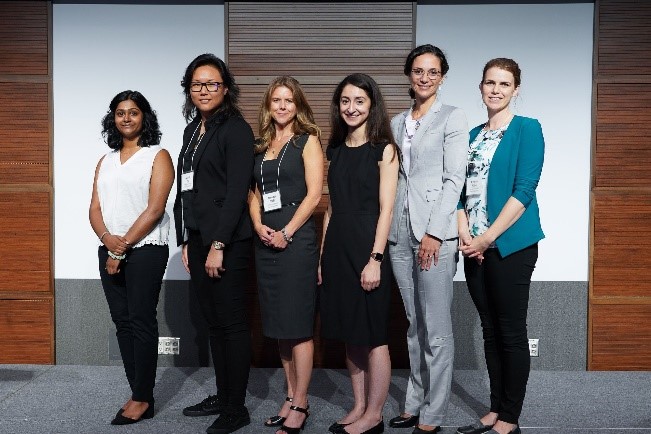Making an Impact in Cleantech

Figure 1: Six women from across Canada have been selected in the in the Women in Cleantech Challenge to compete for the ultimate grand prize: $1 million to build their new cleantech business
The Government of Canada created the Impact Canada Initiative in Budget 2017. The initiative introduces prizes, challenges, and other innovative policy and program approaches to help solve Canada’s biggest challenges. Through the Impact Canada Initiative, Natural Resources Canada is investing $75M over four years in a series of five clean technology challenges under the Cleantech Impact banner.
Four challenges were launched in 2018: The Women in Cleantech Challenge, The Sky’s the Limit Challenge seeking biojet fuel options, The Power Forward Challenge taking on smart grids and energy storage, and the Crush-It! Challenge searching for innovative green mining solutions.
A fifth and final Cleantech Impact challenge focused on reducing reliance on diesel in Northern and remote communities is still in development.

Figure 2: Alexandra Tavasoli (Ontario) developed a greenhouse gas to fuel technology that was among the six innovative projects selected to compete in the Women in Cleantech Challenge
While each individual challenge is unique, all were identified through close collaboration with stakeholders as areas where challenge-based approaches could significantly advance progress and unlock breakthrough solutions to pressing social and technological issues.
While each challenge has a different design, all seek to be as inclusive as possible to draw in a wide range of innovators who may present unique or more comprehensive solutions that would otherwise fall outside the purview of traditional government programming. This broader inclusivity is key, and it is the reason NRCan grounded its approach in an ethos of ‘co-creation’ when designing the challenges.
"I’m most proud of the co-creation approach to challenge design, which ensures that stakeholders are engaged from the start and have an incentive to participate in the challenges. It creates a strong community within which collaboration and innovation can grow.”
- Nicholas Charney, Manager,
Strategic Policy
In practice, this ethos of co-creation has manifested as frequent contact with stakeholders across sectors, open discussions on specific barriers, and joint exploration of promising pathways to overcome them. This has allowed NRCan to integrate stakeholder expertise, resources, and reach to better define design parameters and ambitious - but achievable - outcomes. It has also forced greater interdepartmental collaboration as the challenge domains cut across traditional departmental responsibilities and pull together broader communities. By integrating input from stakeholders early on, NRCan has managed to ensure that its challenges are incrementally designed, proto-typed, and tested so that potential participants see a role for themselves and that financial incentives are calibrated appropriately to attract interest.
Since prizes are only awarded to those who meet the challenge criteria, even more activity is leveraged through the challenge competition to advance the issues. For example, through the Women in Cleantech Challenge, six women have been selected to receive support to develop their clean technologies into successful companies. While the most promising project will be awarded the final prize at the end of the challenge, the other five projects, as well as some of the applicants who were not selected, have the opportunity to attract investment and support through their increased profile provided by challenge participation.

Figure 3: Minister Sohi announces the launch of the Sky’s the Limit Challenge at the Alberta Aviation Museum in Edmonton
This cross-sectoral approach to advancing clean technology supports the efforts of the Pan Canadian Framework on Climate Change and the challenges individually support government priorities such as gender equality, and international commitments such as Mission Innovation and collaboration with the UK.
The Impact Canada Initiative supports the government’s commitment to results-focused program and policy design and delivery, and contributes to the experimentation agenda. Ultimately, the successful elements of these challenges will be integrated into mainstream clean growth programming.
Page details
- Date modified: